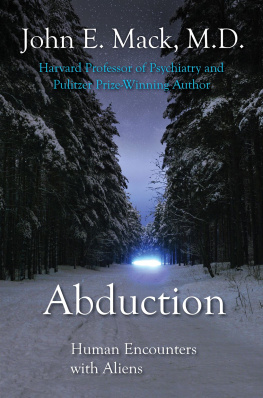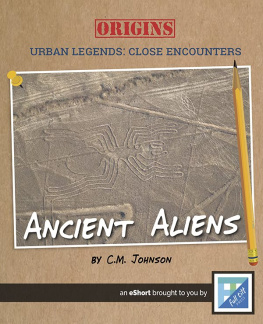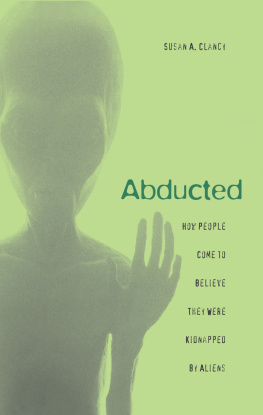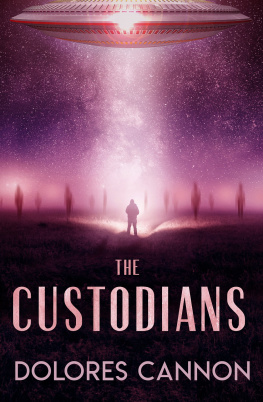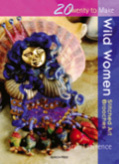John E. Mack - Abduction: Human Encounters with Aliens
Here you can read online John E. Mack - Abduction: Human Encounters with Aliens full text of the book (entire story) in english for free. Download pdf and epub, get meaning, cover and reviews about this ebook. year: 2009, publisher: Scribne, genre: Science fiction / Religion. Description of the work, (preface) as well as reviews are available. Best literature library LitArk.com created for fans of good reading and offers a wide selection of genres:
Romance novel
Science fiction
Adventure
Detective
Science
History
Home and family
Prose
Art
Politics
Computer
Non-fiction
Religion
Business
Children
Humor
Choose a favorite category and find really read worthwhile books. Enjoy immersion in the world of imagination, feel the emotions of the characters or learn something new for yourself, make an fascinating discovery.
- Book:Abduction: Human Encounters with Aliens
- Author:
- Publisher:Scribne
- Genre:
- Year:2009
- Rating:4 / 5
- Favourites:Add to favourites
- Your mark:
- 80
- 1
- 2
- 3
- 4
- 5
Abduction: Human Encounters with Aliens: summary, description and annotation
We offer to read an annotation, description, summary or preface (depends on what the author of the book "Abduction: Human Encounters with Aliens" wrote himself). If you haven't found the necessary information about the book — write in the comments, we will try to find it.
Abduction: Human Encounters with Aliens — read online for free the complete book (whole text) full work
Below is the text of the book, divided by pages. System saving the place of the last page read, allows you to conveniently read the book "Abduction: Human Encounters with Aliens" online for free, without having to search again every time where you left off. Put a bookmark, and you can go to the page where you finished reading at any time.
Font size:
Interval:
Bookmark:
ABDUCTION
ALSO BY JOHN E. MACK, M.D.
Nightmares and Human Conflict
Borderline States in Psychiatry (edited)
A Prince of Our Disorder
Vivienne: The Life and Suicide of an Adolescent Girl
(with Holly Hiekler)
Last Aid
(edited with E. Chivian, S. Chivian, and R. J. Lifton)
The Development and Sustaining of Self-Esteem in Childhood
(edited with Steven Ablon)
The Alchemy of Survival: One Womans Journey
(with Rita S. Rogers)
Human Feelings: Explorations in Affect Development and Meaning
(edited with Steven Ablon, Daniel Brown, and Edward J. Khantzian)
HUMAN ENCOUNTERS WITH ALIENS
John E. Mack, M.D.

In accordance with the wishes of some of the people whose experiences are described in this book, certain names and identifying details have been changed to protect their privacy.
Copyright 1994 by John E. Mack, M.D.
All rights reserved. No part of this book may be reproduced or transmitted in any form or by any means, electronic or mechanical, including photocopying, recording, or by any information storage and retrieval system, without permission in writing from the Publisher.
Charles Scribners Sons | Maxwell Macmillan Canada, Inc. |
Macmillan Publishing Company is part of the Maxwell Communication Group of Companies.
Library of Congress Cataloging-in-Publication Data
Mack, John E., date.
Abduction: human encounters with aliens/John E. Mack,
p. cm.
Includes bibliographical references and index.
ISBN 1-4165-7580-4
ISBN-13: 978-1-416-57580-1
eISBN-13: 978-1-439-19002-9
1. Unidentified flying objectsSightings and encounters.
I. Title.
TL789.3.M33 1994
001.942dc20 93-38116
CIP
Macmillan books are available at special discounts for bulk purchases for sales promotions, premiums, fund-raising, or educational use. For details, contact:
Special Sales Director
Macmillan Publishing Company
866 Third Avenue
New York, NY 10022
10 9 8 7 6 5 4 3 2
Printed in the United States of America
TO BUDD HOPKINS,
who led the way
There are many people to whom I am grateful for the help they gave me in this work. There are those who contributed to the preparation of the manuscript and others who helped with information and ideas. Some people offered direct personal support. A few contributed in more than one of these ways. Some did me the kindness of not speaking critically behind my back when confronted with a subject that may have radically challenged their view of reality. Obviously I cannot name these individuals, but you know who you are.
I wish to acknowledge Miriam Altshuler, Walt Andrus, Michael and Isabel Blumenthal, Thomas E. Bullard, John Carpenter, Blanche Chavonstie, David Cherniack, Jerome Clark, Barbara Corbisier, Joan Erikson, C. Richard Farley, Penelope Franklin, Mary Westbrook Geha, Bill Goldstein, David Gotlib, Stanislav Grof, Hugh Gusterson, Joanne Hager, Richard Haines, Judith Herman, Robert and Joan Holt, Budd Hopkins, Linda Moulton Howe, Barbara Marx Hubbard, David Jacobs, Douglas Jacobs, Eric Jacobson, C. B. Scott Jones, Honey Black Kay, Gurucharan Singh Khalsa, Thomas and Jehane Kuhn, Roberto Lewis-Fernandez, Robert Jay Lifton, Caroline McLeod, John Miller, Malkah Notman, Joseph Nyman, David and Andrea Pritchard, Joseph Regal, Kenneth Ring, Laurance Rockefeller, Mark Rodeghier, Rudolf Schild, Timothy Seldes, Vivienne Simon, Karen Speerstra, Joel Speerstra, Ervin Staub, Myron Stocking, Richard Tarnas, Keith Thompson, George Vaillant, Jacques Vallee, Roger Walsh, Kenneth Warren, Karen Wesolowski and Jennie Zeidman.
I wish especially to thank Pam Kasey, whose partnership throughout this project has made it possible; Dominique Callimanopulos, for her caring and support in many aspects of my work; Pat Carr and Leslie Hansen, for their indispensible care in bringing this book into being; and my wife, Sally, for the gift of her love and support throughout the time that this work was being created.
Finally, and perhaps most important, I want to thank the experiencers themselves, both those whom I have written about in these pages and the many others who have taught me about this phenomenon, for the remarkable courage they have shown in sharing their stories.
An author embarking on a venture as manifestly novel as this one must inevitably ask if some link may be found with his previous work. For me, the connection resides in the matter of identitywho we are in the deepest and broadest sense. In retrospect, this focus has been with me from the beginning, driving my clinical explorations of dreams, nightmares, and adolescent suicide, my biographical researches, as well as the studies of the nuclear arms race and ethnonational conflict and, more recently, transpersonal psychology, with which I have been involved. The abduction phenomenon, I have come to realize, forces us, if we permit ourselves to take it seriously, to reexamine our perception of human identityto look at who we are from a cosmic perspective.
This book is not simply about UFOs or even alien abductions. It is about how this phenomenon, both traumatic and transformative, can expand our sense of ourselves and our understanding of reality, and awaken our muted potential as explorers of a universe rich in mystery, meaning, and intelligence.
When we explore phenomena that exist at the margins of accepted reality, old words become imprecise or must be given new meanings. Terms like abduction, alien, happening, and even reality itself, need redefinition lest subtle distinctions be lost. In this context, thinking of memory too literally as true or false may restrict what we can learn about human consciousness from the abduction experiences I recount in the pages that follow.
ABDUCTION
UFO ABDUCTIONS: AN INTRODUCTION
In the fall of 1989, when a colleague asked me if I wished to meet Budd Hopkins, I replied, Whos he? She told me that he was an artist in New York who worked with people who reported being taken by alien beings into spaceships. I then said something to the effect that he must be crazy and so must they. No, no, she insisted, it was a very serious and real matter. A day came soon when I would be in New York for another purposeit was January 10, 1990, one of those dates you remember that mark a time when everything in your life changesand she took me to see Budd.
Nothing in my then nearly forty years of familiarity with the field of psychiatry prepared me for what Hopkins had to say. I was impressed with his warmth, sincerity, intelligence, and caring for the people with whom he had been working. But more important than that were the stories he told me from people all over the United States who had come forth to tell him about their experiences after reading one of his books or articles or hearing him on television. These corresponded, sometimes in minute detail, to those of other abductees or experiencers, as they are called.
Most of the specific information that the abductees provided about the means of transport to and from the spaceships, the descriptions of the insides of the ships themselves, and the procedures carried out by the aliens during the abductions had never been written about or shown in the media. Furthermore, these individuals were from many parts of the country and had not communicated with each other. They seemed in other respects quite sane, had come forth reluctantly, fearing the discrediting of their stories or outright ridicule they had encountered in the past. They had come to see Hopkins at considerable expense, and, with rare exceptions, had nothing to gain materially from telling their stories. In one example a woman was startled when Hopkins showed her a drawing of an alien being. She asked how he had been able to depict what she had seen when they had only just begun talking. When he explained that the drawing had been made by another person from a different part of the country she became intensely upset, for an experience that she had wanted to believe was a dream, now, she felt, must be in some way real.
Next pageFont size:
Interval:
Bookmark:
Similar books «Abduction: Human Encounters with Aliens»
Look at similar books to Abduction: Human Encounters with Aliens. We have selected literature similar in name and meaning in the hope of providing readers with more options to find new, interesting, not yet read works.
Discussion, reviews of the book Abduction: Human Encounters with Aliens and just readers' own opinions. Leave your comments, write what you think about the work, its meaning or the main characters. Specify what exactly you liked and what you didn't like, and why you think so.

